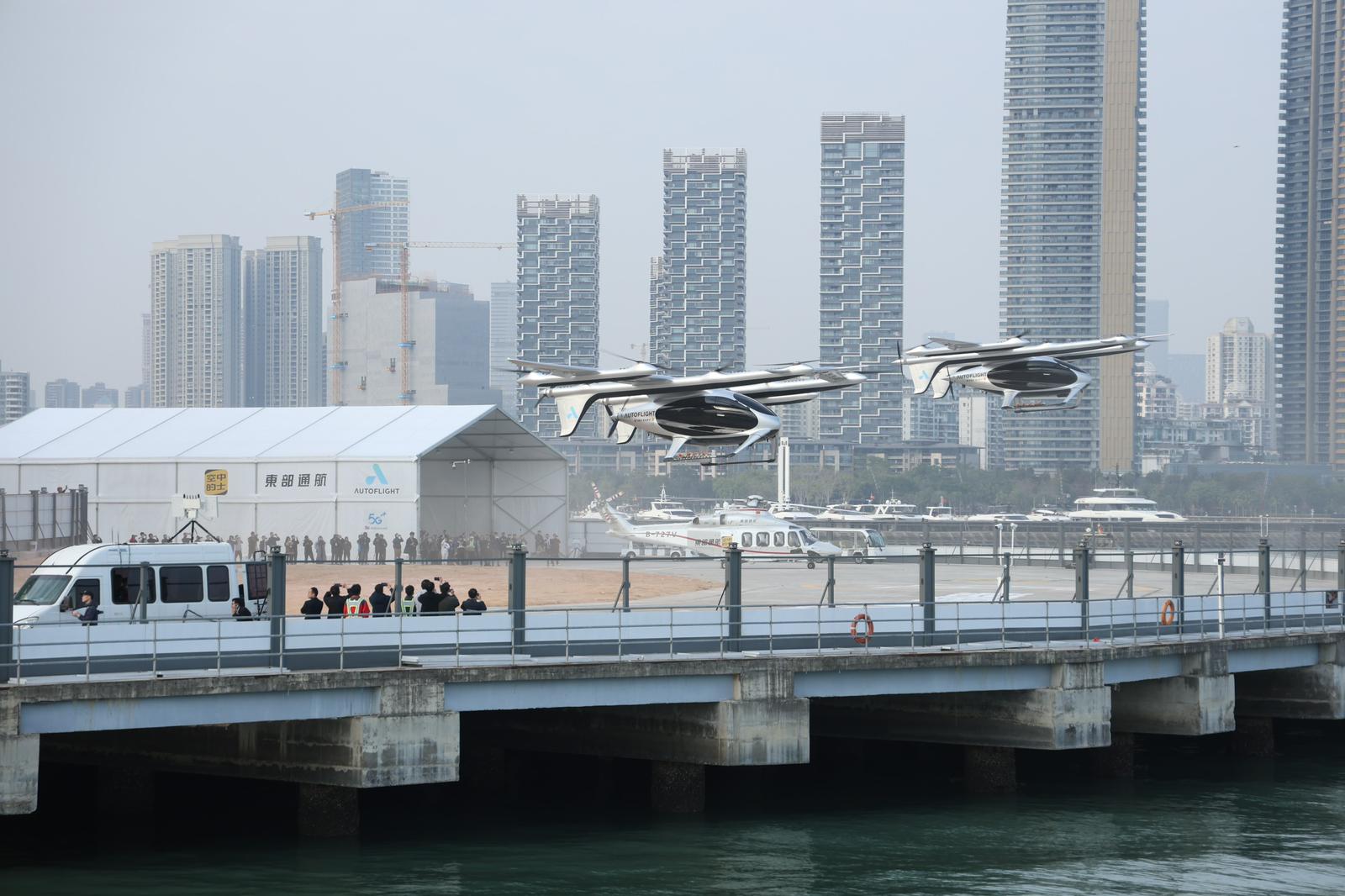AutoFlight on Tuesday demonstrated its five-seat Prosperity eVTOL with a 50-kilometer (31-mile) flight between the Chinese cities of Shenzhen and Zhuhai. The flight across the Pearl River Delta took 20 minutes, compared with what the company said would have required a three-hour car journey due to local traffic.
The flight was conducted without a pilot on board, but the aircraft did carry four crash-test mannequins of a size and weight comparable to passengers.
According to AutoFlight, the Shenzhen-Zhuhai route is typical of the sort of connection that eVTOL air taxi services could make. Local regional government agencies have expressed support for the new mode of public transportation as part of a plan for a so-called “low-altitude economy” built around a network of potentially thousands of vertiports across the Greater Bay Area of southern China, which also includes Hong Kong, Macau, and Guangzhou.
Several other eVTOL manufacturers, including EHang and Zhuhai, are seeking to get their products established in China's Guangdong province. The region’s population is around 86 million and the airspace borders several international airports.
AutoFlight has logged around 10,000 flight hours with various iterations of the aircraft, which has a range of 250 kilometers (156 miles). These include the CarryAll freight-carrying version, which will be able to carry a 400-kilogram payload (880 pounds).
Recently, Chinese rotorcraft operator Heli-Eastern signed an agreement to acquire 100 of the Prosperity aircraft. It plans to use these for routes connecting points such as Shenzhen’s Shekou ferry port and the Jiuzhou ferry port in Zhuhai.
Commercial Service Starts with Freight as Safety Proving Ground
According to Federico Nordenstahl, AutoFlight’s CFO and managing director for Europe, the company has now conducted all the required tests to achieve type certification for the CarryAll aircraft with the Civil Aviation Administration of China (CAAC). The company hopes to get this approval in the coming months so that it can start commercial cargo operations, to get the passenger-carrying Prosperity aircraft approved around 12 months later. It hopes to conduct as many as 300,000 autonomous cargo flights in the Greater Bay Area.
“Our aim is to show how early [freight] operations could be made uncrewed on preprogrammed missions with control station [staff] on the ground who could take over the controls,” Nordenstahl explained. “It is important to start with cargo to gain operational experience and demonstrate safety.”
As with the CAAC’s type certification of EHang’s EH216-S eVTOL vehicle in October 2023, AutoFlight expects the CarryAll, and later the Prosperity, to enter service in China with operational restrictions. For instance, it is unlikely to operate up to its full range in the early stages and early use cases could include express courier service deliveries.
Regardless, Nordenstahl said that the aircraft’s relatively long range for an eVTOL model with current battery technology is significant because it will support operational flexibility. The company says its performance is superior to that of rival lift-and-cruise eVTOL designs thanks to its fixed-wing architecture, 10 lift propellers, and three pushers. “The range matters in terms of unit economics because operators won’t need to stop [so often] to recharge the batteries and so there will be less unused time for the aircraft,” he explained to AIN.
AutoFlight has been working with partners to introduce more advanced batteries and expects to provide more details about these once it achieves initial type certification. Nordenstahl said that the company’s headquarters near Shanghai has the advantage of being close to multiple battery technology leaders.
Middle East Is the Next Target Market
Beyond China, AutoFlight, which has a European subsidiary in Germany, had planned to seek EASA type certification next. However, the company now views its next target markets as being in the Middle East, and it is in talks with aviation authorities in the Gulf States and Saudi Arabia.
Nordenstahl indicated that it is preparing to conduct demonstration flights in the UAE and Saudi Arabia later this year. AutoFlight is eager to tap the region’s apparent desire to be an early adopter of advanced air mobility as evidenced by Dubai’s recent agreement with U.S. eVTOL manufacturer Joby Aviation. It is in talks with prospective operators in the region for applications such as supporting offshore oil and gas platforms.
With production facilities already established in China, AutoFlight feels the lower manufacturing costs available in the country will give it an advantage over Western rivals. During the Paris Air Show in June 2023, company executives indicated to reporters that it expects the price tag for the Prosperity to be between $1.5 million and $2 million.
